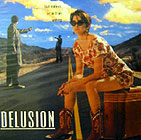|
|
|
|
Delusion
|
 |
|
Carl Colpaert's Delusion is a riveting, off-beat thriller. It concentrates in a minimalist fashion on the shifting ruses and alliances between a trio of characters: a shady businessman on the run (Jim Metzler) and two flaky crooks who intercept him (Jennifer Rubin and Kyle Secor). The plot moves are structured around a classic Hitchcockian MacGuffin – a stash of money in the boot of a car – which the various characters learn about at different moments, with dramatic results. The film belongs to a modern tradition growing out of the films blanc of the 1940s and '50s – a tradition that includes Stephen Frears' The Hit (1984), Eric Red's Cohen and Tate (1989) and virtually all of Monte Hellman's movies. In a curious and arresting way, Delusion has a kinship with Hitchcock's Notorious (1946). A crucial phase in the story is marked by a shift from the captive, observing his kidnappers with an evil eye, to the disenchanted woman of the trio removing herself from the jousting between the two males. In a showdown that both recalls and transforms the staircase finale of Hitchcock's classic (Cary Grant and Claude Rains struggling over possession of a drugged and near-comatose Ingrid Bergman), Rubin drives up to the two men holding guns to each other in a deadlocked stand-off. She asks whether either is willing to go away with her, and then she drives off alone. Colpaert has pulled off a neat trick. His storytelling sensibility veers naturally towards the hip and the flip – creating that droll, couldn't-care-less effect familiar from the '80s films of Jim Jarmusch or Alex Cox. Yet, despite all this insouciant posing and incessant indexing of pop culture history, the story and the characters still manage to be captivating in a conventional way. Barry Adamson's brilliant score perfectly captures this combination of pastiche and conviction. © Adrian Martin October 1993 |
![]()